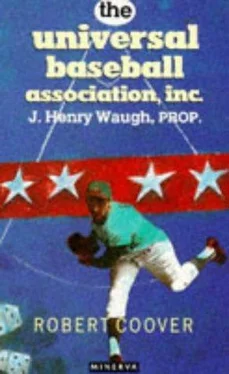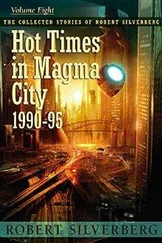The rain tumbled like gentle applause on his umbrella. Under it he walked, skirting the puddles, dry in the deluge, as though glassed in under a peaked black dome. Hunched-up cars pushed through the streets like angry defeated ballplayers jockeying through crowds on their way to the showers. Henry waited at a corner for a red light. Offices emptied out, filling the streets. A policeman in a slicker stood stoically in the thick of the traffic, blowing his whistle and jerking his arms like a base coach urging a runner on. The light changed to green and Henry crossed over to his bus stop. Green. Slicker. Cop. Cop* per Greene. Might try it. Have to jot it down when he got home.
Everywhere he looked he saw names. His head was full of diem. Bus stop. Whistlestop. Whistlestop Busby, second base. Simple as that. Over a storefront across the street: Thornton's. He'd been looking for a name to go with Shadwell, and maybe that was it. Thornton Shadwell. Tim's boy. Pitcher like the old man? Probably. But a lefty. Will he play for the Stones? No. Unless the old man gets sacked this year. His Keystones were in a slump. Manager of the Year last year, in trouble this. Life was fast and brutal. More likely, Mel Trench's Excelsiors will grab young Shadwell up. Outstanding prospect.
Henry was always careful about names, for they were what gave the league its sense of fulfillment and failure, its emotion. The dice and charts and other paraphernalia were only the mechanics of the drama, not the drama itself. Names had to be chosen, therefore, that could bear the whole weight of perpetuity. Brock Rutherford was a name like that; Horace (n) Zifferblatt wasn't. Now, it was funny about names. All right, you bring a player up from the minors, call him A. Player A, like his contemporaries, has, being a Rookie, certain specific advantages and disadvantages with the dice. But it's exactly the same for all Rookies. You roll, Player A gets a hit or he doesn't, gets his man out or he doesn't. Sounds simple. But call Player A "Sycamore Flynn" or "Melbourne Trench" and something starts to happen. He shrinks or grows, stretches out or puts on muscle. Sprays singles to all fields or belts them over the wall. Throws mostly fast balls like Swanee Law or curves like Mickey Halifax. Choleric like Rag Rooney or slow and smooth like his old first-base rival Mose Stanford. Not easy to tell just how or why. Or take Old Fennimore McCaffree. He was "Old" the year he came up to play third base for the Knicks. And not just because he'd got an unlucky throw of the dice on the Rookie Age Chart and started in as a thirty-year-older, but because that was simply who he was: Old Fennimore. Scholar and statesman. Dark. Angular. Intense. Sinewy. Fast. Tough. Year XIX. Same Rookie year as Brock Rutherford. Fenn got overlooked in all the other excitement that year, but in XXI he stroked out a.371 to cop both the batting title and the year's Most Valuable Player Award. Determined man. But still Old Fenn. Now, just inquire of poor Woody Winthrop, who till then had been the perennial third-base All Star selection, and who, in fact, if Henry remembered rightly, had himself in that Year of the Rookie, Year XIX, won the MVP Award, if that was Player A he was getting eclipsed by. No, friends and voters, that was Old Fennimore. Shrewd, relentless, cool, reliable Fenn. When you scored against the Knickerbockers in those years, you even felt a chill just crossing third under Old Fenn's glare. Then, suddenly, he was not just old, he was too old. Great playing record, but too brief to be sure of making the Hall of Fame. And for Fenn there was no halfway house in history. A spectacular career as manager might be enough more to do the trick, he figured. So he talked Woody Winthrop, by then the champion Knickerbockers boss, into quitting his job to enter Association politics, while he himself, wily Old Fenn McCaffree, took over as manager of the team Woody had built. Something of a bastard, but he won ball games, and that was what counted in baseball. Twelve years, six championships. And so he did make it: Hall of Fame. And now he was even the UBA Chancellor. And whom did he succeed? Woody Winthrop. Looking back, it seemed all but necessary. Strange. But name a man and you make him what he is. Of course, he can develop. And in ways you don't expect. Or something can go wrong. Lot of nicknames invented as a result of Rookie-year surprises. But the basic stuff is already there. In the name. Or rather: in the naming.
The bus was late. Due to the bad weather probably. He might as well have stayed at the office. But no, he'd enjoyed this moment. It had given him time to think. Prepare his mind for tonight's activity. Exciting year, LVI. Years from now, he'd look back on it with the same nostalgia he was feeling now for Year XIX.
"Henry!" It was his friend Lou, trotting flatfooted through the puddles, holding his hat, coat undone and flapping in the rain. "Henry!" lie called again, but then couldn't get his breath to continue. The bus came. Henry smiled at Lou, squeezed aboard. "I… guess (wheeze) I'll… ride along," Lou gasped, and intruded his bulk.
The bus was jammed, they had to stand. People jostled, rammed them moistly toward the rear. Rain drummed on the roof. If skyscrapers were penis-prisons, what were the buses? the efferent tubes? The driver barked orders. Passengers protested at the shoving. Lou was the biggest in sight, so everybody turned their darkest looks on him. A woman complained about getting elbowed, and though it wasn't Lou's fault, he tipped his hat in apology, dripping water from the brim onto the evening paper of a man sitting next to them. The paper spoke blackly of bombs, births, wars, weddings, infiltrations, and social events. "You know, Lou," Henry said, "you can take history or leave it, but if you take it you have to accept certain assumptions or ground rules about what's left in and what's left out."
"How's. . that?" squeaked Lou, wrinkling up his nose. His breath was still coming in short spasmodic gulps, and one gulp broke his question right in the middle. Lou oughtn't run so hard with his weight.
"History. Amazing, how we love it. And did you ever stop to think that without numbers or measurements, there probably wouldn't be any history?" He asked it that way for Lou's sake. Really, he was thinking the thoughts he always thought on buses and subways, drawing the old comparisons — why, he wondered, at such an inherently joyful moment, was he feeling so melancholy? Was it the rain? or maybe the unspoken recognition that Damon Rutherford, wonderful as he was, would someday have to hang up his cleats like all the rest? Maybe it was only because this was Year LVI: he and the Association were the same age, though of course their "years" were reckoned differently. He saw two time lines crossing in space at a point marked "56." Was it the vital moment? Silly idea. It would probably get better next season. "At 4:34 on a wet November afternoon, Lou Engel boarded a city bus and spilled water from his hat brim on a man's newspaper. Is that history?"
"I… I dunno," stammered Lou, reddening before the sudden distrustful scowl of the man with the newspaper. "I (wheeze) guess so."
"Who's writing it down?" Henry demanded.
"Henry, listen, what's the matter? (Wheeze.) What was the point of that row with Mr. Zifferblatt anyhow? Where were you this (wheeze) morning? And where were you going in such a rush? Why, you left nine (wheeze) minutes early, did you know that? I had to run five blocks" — here his voice broke, and he had to gulp for air again—"almost to catch up to you. What is it, Henry? Can I help somehow? Is (wheeze) something wrong?" Once he got his wind, it came like a gale.
"No, no, like I told you, Lou, everything's fine, just fine. Wonderful, in fact." His stop. He stepped down, and Lou clumsily followed. Henry was impatient to get home, to look at that box score again, but he waited for Lou, who had no umbrella.
Читать дальше












